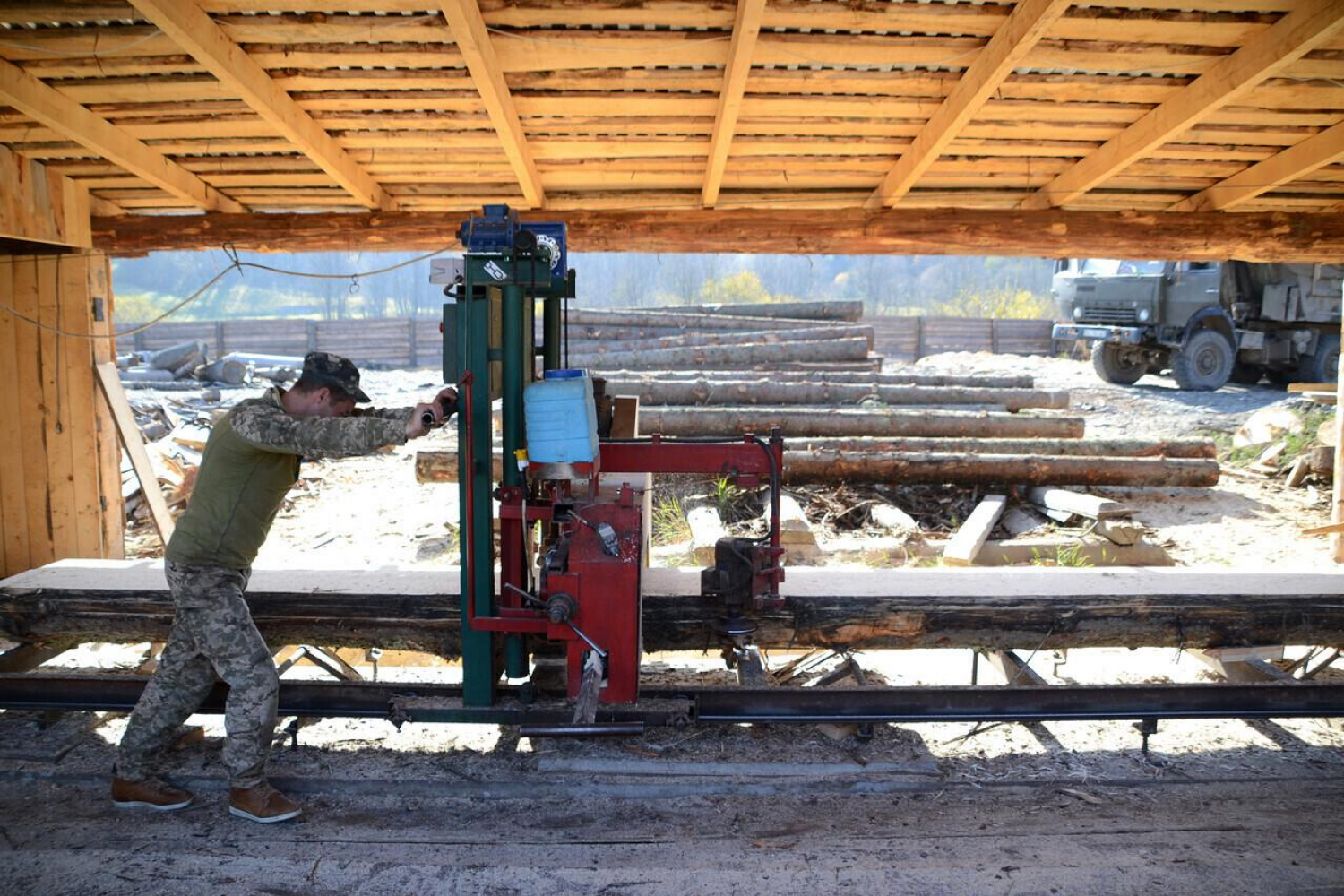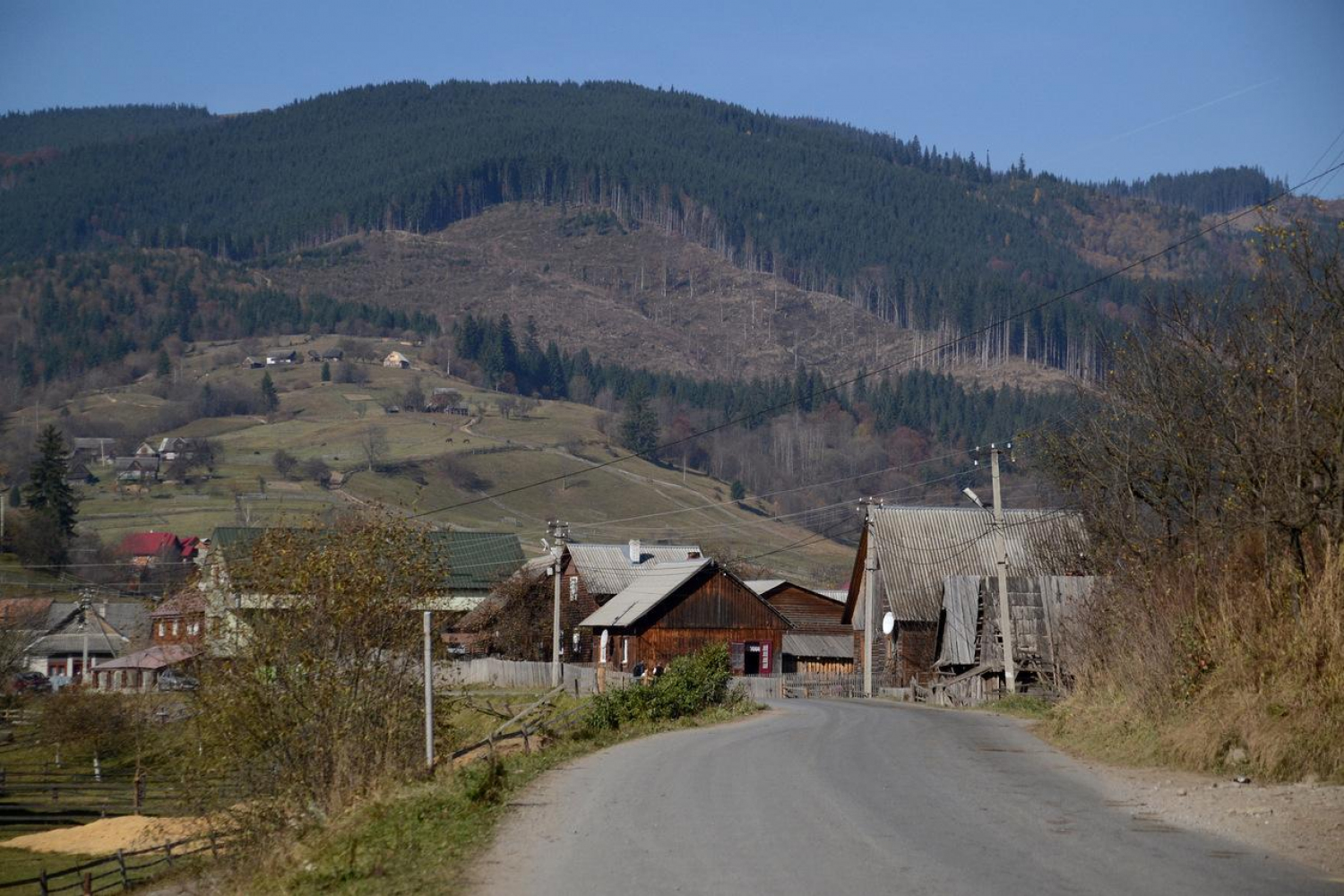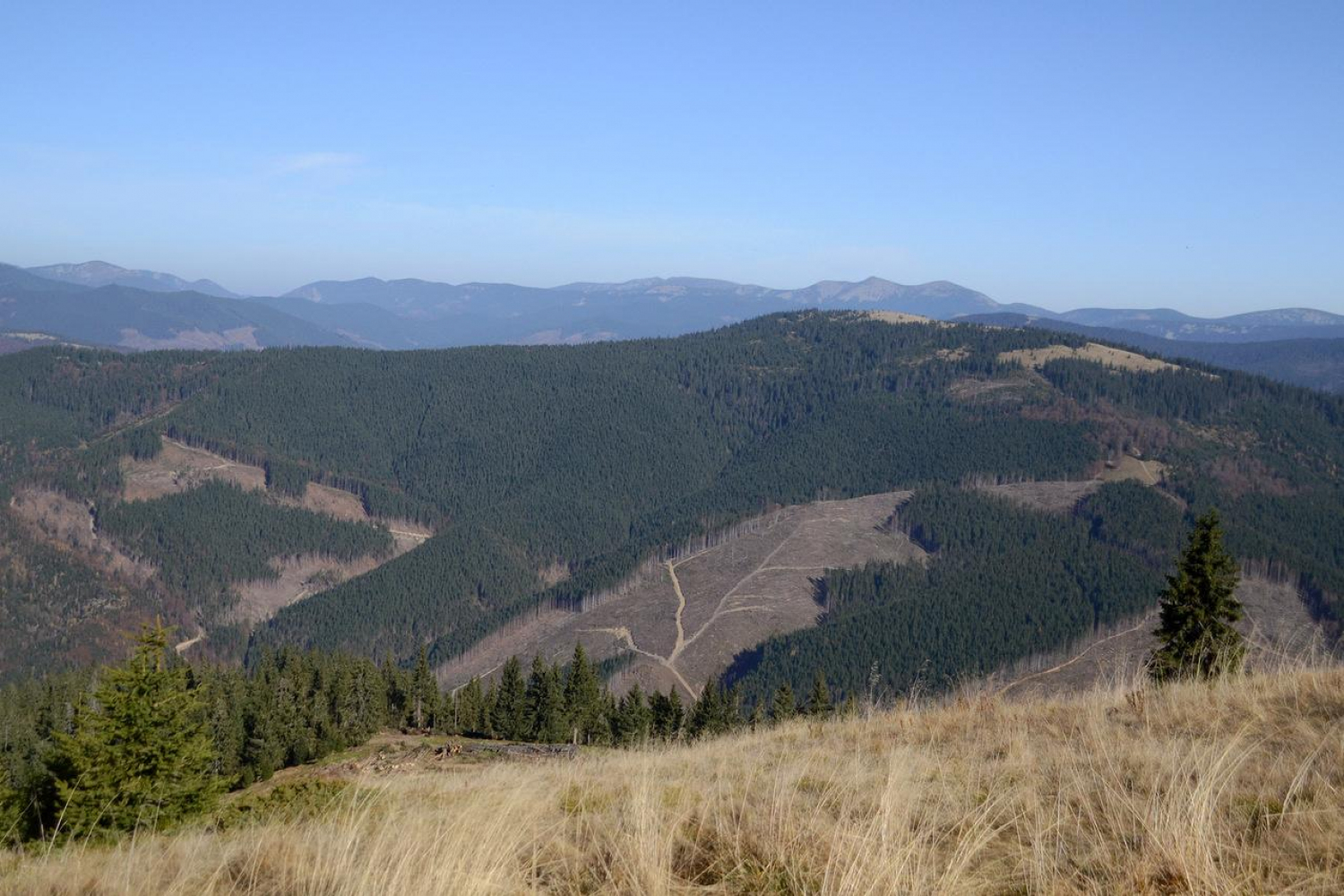Pieter Stockmans volgt het mondiale optreden van de Europese Unie, het Europese vluchtelingenbeleid, de evoluties in Midden-Europa en de regio ten oosten van de EU.
‘Illegal wood does not disappear from Ukrainian forests on its own’

© Xander Stockmans
A bizarre observation: in recent years, more wood was exported from Ukraine than was officially logged. This can only be explained by illegal logging, with a sales value of more than one billion euros per year. The harvested wood has to meet the insatiable demand of large companies and eventually ends up in IKEA furniture, printing paper or clothes at H&M.
On the peaks of the Ukrainian mountain massif, the man points to the mountain flank on the other side of the valley. ‘All those roads have been dug out, all that forest has been cut down,’ he sighs.
The logging roads form the pattern of veins in a lung. Ironically, because the lung of the planet has just been squeezed shut here. The local state forestry agency cut the mountain flank bare. Healthy trees, felled under the pretext that they were sick.
According to figures from the Statistical Service of the Ukrainian government, eight million cubic meters of wood were logged in 2017 when applying forest management plans. But a total of 21 million cubic meters were cut. So that figure includes thirteen million cubic meters of “sick wood”, a doubling compared to twenty years ago. The state forestry agencies abuse this so-called sanitary logging in order to cut more trees than their own forest management plans allow.
The man we are talking to has a sawmill in a village that lives from logging, somewhere in the Ukrainian Carpathians. He tells his story, but has already been threatened twice over the phone and doesn’t want us to use it for an article. Whistle-blowers regularly receive threats here. Talking to NGOs or journalists endangers their jobs and their livelihood.
The EU imports more illegal timber from Ukraine than from Latin America, Southeast Asia and Africa combined. Value: more than 1 billion euros annually.
Three years ago, the British NGO Earthsight investigated eighteen logging sites in the Ukrainian Carpathians. Three quarters of the wood was found to have been illegally logged. The government’s inspection services also regularly detect violations of the law. The number of detections doubled between 2010 and 2016. In recent years, more timber was exported from Ukraine than was supposedly logged. In 2016, for example, two million cubic meters were logged, but three million cubic meters were exported. The surplus was cut illegally and sold to companies without documents.
Three quarters of all that wood is exported to the European Union, especially to Romania, Poland and Germany. The EU imports more illegal timber from Ukraine than from Latin America, Southeast Asia and Africa combined. In just four years, the amount of illegal timber from Ukraine increased by 75 percent. In 2017, its value exceeded 1 billion euros.
The largest importers are the Austrian wood giants Kronospan, Swiss-Krono, Egger and Holzindustrie Schweighofer, the world’s largest producers of wood-based panels. And the American company International Paper, the largest paper company in the world. They have wood and pulp mills in several EU member states neighboring Ukraine. From there, more or less finished parts are transported to, for example, IKEA. The wood also ends up in the printing paper of HP and Xerox, and in the fibers of H&M’s clothes.

© Xander Stockmans
Shadow sawmills
A worker grabs a tree trunk with his crane and brings it to the saw. The next worker cuts the trunk into wooden panels. They are preparing a load for wood processing companies in Hungary. The price they get for it is low. The supply is too big.
‘It was never worse than now. Huge quantities are being cut. They are so greedy.’
This is not only detrimental to the owners of Ukrainian sawmills, it is also a threat to the forests. Forests like this once covered the European continent. In the Ukrainian Carpathians you can find the last, large, continuous remnants of them. The brown bear, the lynx and the European bison live here.
Earthsight found a whistleblower at a Ukrainian state forestry agency, who wanted to speak because he is tired of the corruption. ‘Often we cut as much outside as within the official marking of the allowed area,’ he says. ‘It was never worse than it is now. Huge quantities are being logged. They are so greedy.’
Each authority demands bribes. For better access to the forest, for access to the best parts, for logging outside the permitted limits, for not have to clean up the remains of the logging, for logging in protected areas. Also owners of private sawmills must participate in the system. Some no longer log themselves, but buy wood at the public auctions of the state forestry agencies.
But there, too, they have to deal with corruption. Some state forestry agencies sell the wood at a lower price or falsely classify it as firewood in exchange for bribes, another official from the largest state forestry agency in the Ukrainian Carpathians told Earthsight. After all, firewood can be sold through direct contacts outside public auctions, to so-called ‘shadow sawmills’ without a permit.
The Ukrainian Court of Audit calculated that, as a result, the state lost millions of euros in the first half of 2017. These shadow companies are supposedly made up of businessmen, but they have ties with the officials of the state forestry agencies.

© Xander Stockmans
Export ban
By far the greatest corruption occurs during export to the EU. Public prosecutors exposed in 2016 that customs officials cooperate in the falsification of export documents and certificates of origin. The European Commission and importing member states are aware. However, the volumes of timber purchased by the timber giants from the state forestry agencies did not decrease afterwards. This was evidenced by hundreds of customs documents that Earthsight examined.
If companies import illegally obtained timber into the EU, they are committing a crime under European law. This is just as true when they do not limit the risk to a “negligible level”.
To shield themselves, companies often use shadow companies that do the importing. In this way, they are themselves further down the chain and, according to the European Timber Regulation, do not have to take the mandatory precautions. For example, International Paper uses a small company located in an apartment above a Polish supermarket.
In 2016, the Ukrainian parliament approved a ten-year ban on the export of unprocessed tree trunks. In order to protect its own wood processing industry, but also to dampen the insatiable demand for Ukrainian wood. And to create room for measures against corruption and large-scale illegal logging.
‘The EU wants Ukraine to lift its ban on the export of logs. But that would only increase the flow of illegal timber to the EU.’
But the EU wants Ukraine to lift its export ban. It would go against the Association Agreement, which prescribes free trade. However, the Association Agreement also contains an obligation for sustainable forest management, and the Ukrainian government maintains that the export ban is therefore necessary.
Nevertheless, the European Commission launched an arbitration procedure against Ukraine and the lifting of the export ban even became a condition for the next financial support package of 1.8 billion euros.
Ostap Jednak, former Chairman of the Committee on Environmental Policy of the Ukrainian Parliament, is hard on the EU: ‘Why is the EU linking financial support to the lifting of the export ban, and not to a reform of the Ukrainian forestry sector? That says it all, doesn’t it? If the ban is lifted now, without reform of the sector, the flow of illegally logged timber to the EU will only increase.’
The major lobbying organisations of the European timber industry, EOS and CEPI, are continuously lobbying the European Commission to increase pressure on Ukraine. It is these same companies that benefit from cheap Ukrainian timber, and that cannot be ‘convinced’ by the EU to impose strict controls on corruption.
Meanwhile, companies are trying to circumvent the export ban. A year after the proclamation, there was suddenly a sharp increase in so-called Belarusian timber, which was exported via Ukraine to Romania. In reality it was Ukrainian wood.
The most common method to circumvent the export ban is the false classification as firewood. ‘When we export wood, we put “firewood” on the documents. Everyone knows that, including my boss’, says the whistle-blower of the state forestry agency.
The proportion of exported firewood rose from 33 to 50 percent. European customs authorities calculated that one million cubic meters of logs covered by the export ban was imported into the EU. In 2016, for example, the Ukrainian police intercepted fifty wagons containing falsely classified logs from a state forestry agency. The cargo was destined for a pulp mill of paper producer Mondi and a sister company of Lenzing, one of the largest producers of clothing fibres for H&M in Czechia.

© Xander Stockmans
Self-service
In the green wavy landscape of Jasinja you will find a sawmill in every street. Where the asphalt roads turn into gravel roads you see the barren mountainsides looming up behind the last houses.
In 2018, the Environmental Inspectorate of Ukraine identified large-scale violations by the state forestry agency of Jasinja. From their report: ‘Illegal logging of trees, irreparable damage to surrounding trees, no marking, leaving behind logging waste, damage to soils, harvesting during prohibited periods’.
‘But not a single guilty party was brought to justice and the illegal logging continues,’ says Jechor Chrynyk of the Ukrainian Nature Conservation Group, an NGO.
‘At the end of 2019, we again documented massive illegal sanitary logging in Jasinja. They are literally destroying a healthy forest, even pristine beech forests where many bears still live.’
The European Commission asked for consultations with the Ukrainian government. But due to delays in decision-making, illegal logging continues.
We speak with Vassyl Telychuk, director of Jasinja’s state forestry agency. He poses in front of a bear carved in wood at the entrance to his office. ‘Corruption? Bribes? It probably happens, once in a while’, he dismisses the question. Across the street two old men are talking in front of a large poster of the victims of the anti-corruption Maidan-uprising of 2014.
After a technical mission of the EU in February 2018, the experts decided that it should no longer be possible for Ukrainian state forestry agencies to grant logging permits themselves while at the same time ensuring nature conservation. ‘The director was dismissed a month ago. That’s easy, but the state forestry agency itself has still not been reformed,’ says Chrynyk.
The European Commission knows that the state forestry agency is denying the problems and therefore demanded a meeting with the Minister of the Environment. The Ukrainian government postponed these consultations because of lengthy staff changes at the ministry. Chrynyk: ‘For more than a month there was no functioning Ministry of the Environment in Ukraine. In March 2020, a videoconference was finally held, and the ministry adopted guidelines for environmental impact assessments in forestry. But there are still no independent expert groups to carry out these assessments.
‘During these delays in decision-making, illegal logging continues,’ says Chrynyk.

© Xander Stockmans
Potemkin forests
Despite all the corruption, ninety percent of the public forests in the Ukrainian Carpathians receive the FSC label, the most famous label of sustainably logged timber.
Two separate whistleblowers, including the ex-boss of the largest state forestry agency, told Earthsight in 2017 and in 2019 that the state forestry agencies take the inspectors to “Potemkin Forests”: forests that are specially prepared for inspection.
‘The FSC inspectors just tick a few boxes, a bureaucratic formality,’ said a whistleblower. ‘The forest rangers receive them, lead them to a chalet in the forest and organize a party with food and drinks. The inspectors are not free to go where they want.’
Whistleblowers at state forestry agencies say that they take the FSC inspectors to forests that have been specially prepared for inspection.
Earthsight asks for unannounced inspections. But ‘we have logistical limitations and our time is limited’, responds FSC.
Moreover, the FSC rules do not require the inspectors to look for additional information themselves, for example from court cases against corruption. ‘Our new standards for forest management in Ukraine will require inspectors to also consult legal cases’, FSC responds. ‘In June 2020, the international FSC board of directors decided to develop specific measures for “high risk areas” such as Ukraine.’
FSC applies the presumption of innocence: an FSC certificate is only revoked if there is a conviction. ‘It happens that legal action is abused to harm opponents’, says Bart Holvoet of FSC Belgium. But according to Earthsight, this is contrary to the precautionary approach in the European Timber Regulation, which requires that the risk of illegality is ‘negligible’. European importers who rely on FSC certification for compliance with the Timber Regulation can therefore be prosecuted.
The European Commission recognizes this problem: ‘Certification in countries with serious corruption problems does not have the same value as in well-functioning countries. Earthsight’s research emphasizes that’.
Critics expect restraint from FSC. But since the European Timber Regulation came into force, FSC has doubled its certifications in Ukraine. ‘It’s true that the size of the area of FSC forests has increased significantly in Eastern Europe, especially in Ukraine. FSC is a market-oriented system. It is logical that the FSC area is growing where there is a high demand for wood,’ says a reaction from FSC to Earthsight’s report.
Earthsight calls this a destructive logic: ‘It is now more important to leave more forests standing worldwide, than to respond to the growing demand of timber producers without even giving consumers the guarantee that the timber is legal’.
The slack attitude of the European Commission
Since last year, the import of illegally harvested timber from Ukraine has invariably been on the agenda of an expert working group of the European Commission and EU Member States. This official working group monitors the application of the Timber Regulation.
In June 2019, this official working group decided that ‘risk mitigation measures’ are necessary for Ukraine. But the European timber giants continue to purchase timber from Ukrainian state forestry agencies, even during criminal investigations. Therefore, the working group announced to prepare guidelines for such companies. But in the meantime, only ‘formal conclusions for governments’ have been drawn.
‘The supply chains and corruption in the Ukrainian logging sector are complex’, says Anne Delvaux of the European Commission in a response to MO*. ‘We will formulate formal conclusions on the situation in Ukraine, which should ensure an equal interpretation of when exactly the risk of illegal imports is “negligible” and when it is not.’
It seems that the EU does not want to impose any additional obligations on companies. The risk of corruption is widespread throughout the country, an EU mission to Ukraine reported two years ago, but there was not enough information publicly available to “convince” importing companies of the risks. Earthsight fears that the member states that benefit most economically from Ukrainian timber imports want to leave everything as it is.
The FSC label as alibi
‘The guidelines or conclusions of the European Commission are being watered down too much’, says Tara Ganesh, researcher at Earthsight. ‘The only measure that EU importers of Ukrainian wood will have to comply with is that the wood carries the FSC label.’ FSC is an NGO that awards a label of sustainable forest management. But Earthsight found a lot of wood that had been illegally harvested and yet had been awarded the FSC label.
‘Illegal wood does not disappear from Ukrainian forests on its own,’ Ganesh continues. ‘We expect strict guidelines, which should require companies to assess corruption risks themselves. These guidelines must also state that companies cannot rely on certification to guarantee legality.’
‘The overwhelming demand for timber from EU companies is prompting foresters from this poor EU country to explore the limits of legality. It has never been more important to hold these companies to account. But none have ever been punished or even blamed’.
‘The EU should use the stick instead of the carrot, by obliging the competent authorities to impose sanctions on companies that trade in unreliable timber. Turning a blind eye to violations of the law by our own European companies, and at the same time encouraging Ukraine to fight corruption: how could that help Ukraine?’
Maak MO* mee mogelijk.
Word proMO* net als 2793 andere lezers en maak MO* mee mogelijk. Zo blijven al onze verhalen gratis online beschikbaar voor iédereen.
Meer verhalen
-
Report
-
Report
-
Report
-
Interview
-
Analysis
-
Report










 Oxfam België
Oxfam België Handicap International
Handicap International